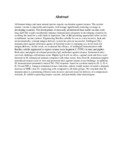A temperature resistant needle free vaccine against tetanus

View/
Date
2012Author
Hellen, Amuguni
Sangun, Lee
David, Brown
Gerald, Keusch
Abraham, Sonenshein
Saul, Tzipori
Metadata
Show full item recordAbstract
All human beings and most animal species require vaccination against tetanus. The current tetanus
vaccine is injectable and requires cold storage significantly reducing coverage in developing
countries. The development of mucosally administered heat-stable vaccines with long shelf life
would considerably enhance immunization programs in developing countries by avoiding the need
for a cold chain or injections. One of the promising approaches relies on live recombinant vaccine
carriers. Engineering Bacillus subtilis for use as a non-invasive, heat and environmentally-resistant
28
antigen delivery system has proven successful. Sublingual (SL) immunization against infectious
agents or bacterial toxins is emerging as a novel route for antigen delivery. In this work, we evaluated
the efficacy of sublingual immunization with Bacillus subtilis engineered to express tetanus toxin
fragment C (TTFC) in mice and piglets. Both mice and piglets developed protective IgG antibodies
against tetanus. Immunized mice survived challenge with tetanus toxin. Higher IgA levels in saliva,
vaginal wash and feces were detected in SL immunized animals compared with other routes. Sera
from SL immunized piglets neutralized tetanus toxin in vitro and protected mice against tetanus toxin
challenge. In addition, SL immunization promoted a mixed Th1 /Th2 response, based on cytokine
analysis (IL-2, IL-4, IL-10 and INFy). Antigen-stimulated tissues (intestine, spleen, lymph nodes)
revealed a dramatic increase of MHC class II+ expressing cells compared to all other groups. We
conclude that SL immunization is a promising effective non invasive and safe route for delivery of a
temperature-resistant, B. subtilis expressing tetanus vaccine, and potentially other immunogens.
